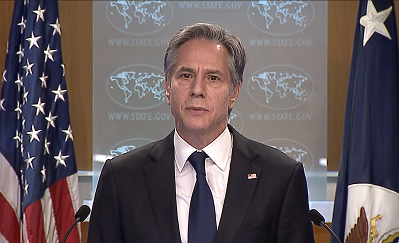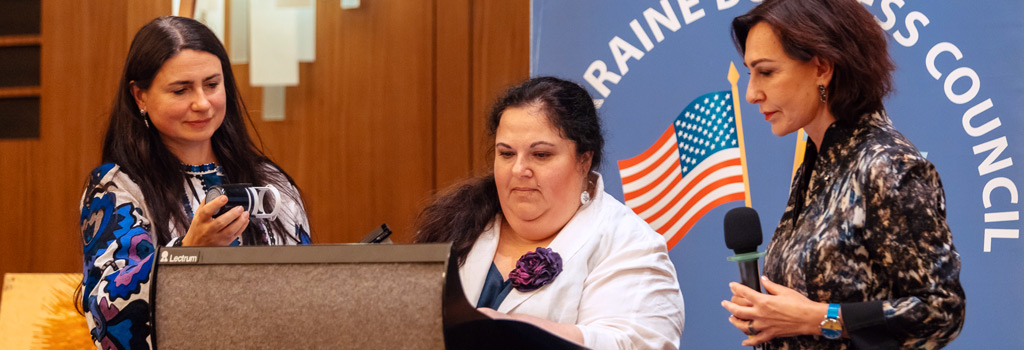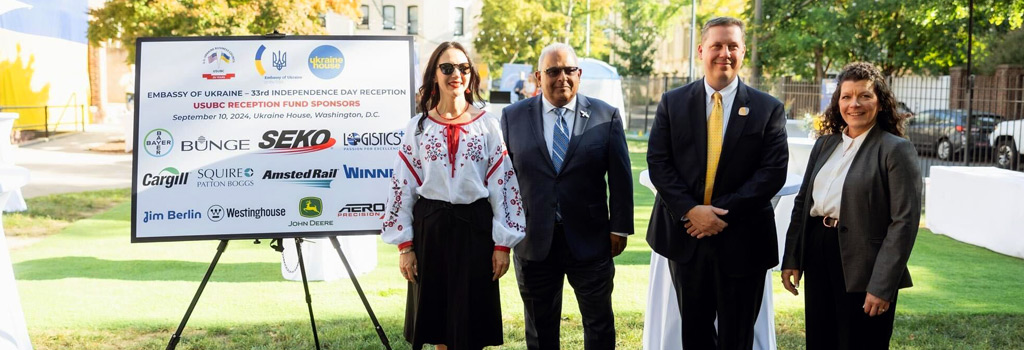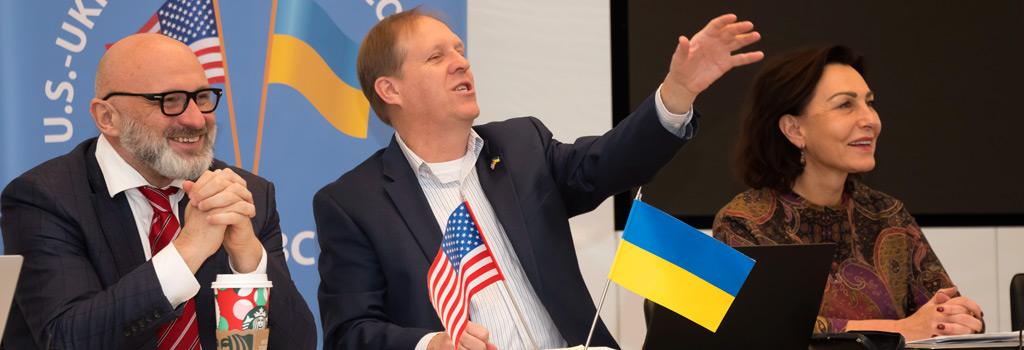Featured Galleries USUBC COLLECTION OF OVER 160 UKRAINE HISTORIC NEWS PHOTOGRAPHS 1918-1997
 Holodomor Posters
Holodomor Posters

UKRAINE - SECRETARY ANTONY J. BLINKEN
AT A PRESS AVAILABILITY
 U.S. Department of State
U.S. Department of State
Washington, D.C.
Wednesday, January 26, 2022
Antony J. Blinken, Secretary of State
Press Briefing Room
SECRETARY BLINKEN: Good afternoon, everyone.
Last week in Geneva, Russian Foreign Minister Lavrov and I met to discuss the crisis instigated by Russia’s military build-up on Ukraine’s borders and steps to de-escalate tensions and pursue diplomacy. Russia had previously outlined its concerns and proposals in writing, and last week I told Foreign Minister Lavrov that the United States would do the same.
Today, Ambassador Sullivan delivered our written response in Moscow. All told, it sets out a serious diplomatic path forward, should Russia choose it.
The document we’ve delivered includes concerns of the United States and our allies and partners about Russia’s actions that undermine security, a principled and pragmatic evaluation of the concerns that Russia has raised, and our own proposals for areas where we may be able to find common ground.
We make clear that there are core principles that we are committed to uphold and defend – including Ukraine’s sovereignty and territorial integrity and the right of states to choose their own security arrangements and alliances.
We’ve addressed the possibility of reciprocal transparency measures regarding force posture in Ukraine, as well as measures to increase confidence regarding military exercises and maneuvers in Europe.
And we address other areas where we see potential for progress, including arms control related to missiles in Europe, our interest in a follow-on agreement to the New START treaty that covers all nuclear weapons, and ways to increase transparency and stability.
We’ve put these ideas forward because they have the potential – if negotiated in good faith – to enhance our security and that of our allies and partners while also addressing Russia’s stated concerns through reciprocal commitments.
Our response to Russia reflects what I said in Kyiv, Berlin, and Geneva last week. We’re open to dialogue, we prefer diplomacy, and we’re prepared to move forward where there is the possibility of communication and cooperation if Russia de-escalates its aggression toward Ukraine, stops the inflammatory rhetoric, and approaches discussions about the future of security in Europe in a spirit of reciprocity.
Our responses were fully coordinated with Ukraine and our European allies and partners, with whom we’ve been consulting continuously for weeks. We sought their input and incorporated it into the final version delivered to Moscow.
Additionally, NATO developed and will deliver to Moscow its own paper with ideas and concerns about collective security in Europe – and that paper fully reinforces ours, and vice versa. There is no daylight among the United States and our allies and partners on these matters.
We’ve shared our response paper with Congress, and I’ll be briefing Congressional leaders on this later today and consulting with them on our approach. As you know, there’s strong bipartisan interest and deep expertise on the Hill when it comes to Ukraine and Russia, and we very much appreciate having Congress as a partner as we move forward.
We’re not releasing the document publicly because we think that diplomacy has the best chance to succeed if we provide space for confidential talks. We hope and expect that Russia will have the same view and will take our proposals seriously.
I expect to speak to Foreign Minister Lavrov in the coming days after Moscow has had a chance to read the paper and is ready to discuss next steps.
There should be no doubt about our seriousness of purpose when it comes to diplomacy, and we’re acting with equal focus and force to bolster Ukraine’s defenses and prepare a swift, united response to further Russian aggression.
Three deliveries of U.S. defensive military assistance arrived in Kyiv this week, carrying additional Javelin missiles and other anti-armor systems, 283 tons of ammunition and non-lethal equipment essential to Ukraine’s front-line defenders. More deliveries are expected in the days to come. We have provided more defensive security assistance to Ukraine in the past year than in any previous year.
Last week, I authorized U.S. allies – including Estonia, Latvia, and Lithuania – to provide U.S.-origin military equipment from their inventories for use by Ukraine.
Also last week, we notified Congress of our intent to deliver to Ukraine the Mi-17 helicopters currently held in Defense Department inventories, five of them.
Additionally, the Secretary of Defense announced on Monday that 8,500 U.S. service members currently stationed in Europe and the United States have been placed in heightened readiness – heightened readiness to deploy – to ensure that we’re able to support the NATO Response Force swiftly if it’s activated by the North Atlantic Council to harden the Allies’ eastern flank. Other NATO Allies have also announced steps they’re prepared to take, and we expect more in the coming days. We’ve taken this step out of prudence. We hope those forces don’t have to be activated for deployment, but if they are, we will be ready.
We’re also continuing to coordinate with our European allies and partners on severe economic sanctions to hold Moscow accountable for its actions. We’ve developed a high-impact, quick-action response that would inflict significant costs on the Russian economy and financial system.
As part of our response, we’re also prepared to impose export controls that will have a longer-term effect, denying Russia products that it needs to fulfill its strategic ambitions.
On top of all of that, our allies and partners are also stepping up to provide assistance to Ukraine in various and mutually reinforcing ways. As we have done many times before, the Alliance and individuals Allies are coming together to support our partners and to defend what should be inviolable principles that have helped provide unprecedented security, stability, and prosperity for decades in Europe and around the world.
Finally, we’re looking to support our allies and partners in dealing with the secondary negative consequences of Russia’s destabilizing acts.
For example, we know that Ukraine’s economy and financial position is being affected by this crisis. And just as we’re bolstering Ukraine’s security, so too are we looking for how we can support its economy beyond the significant assistance we’re already providing. Our European allies and partners are doing so as well, and that’s another matter that I’ll have an opportunity to discuss with Congress later this afternoon.
As we’re taking steps to ensure that the global energy supply isn’t disrupted – that too is an important focus – should Russia choose to weaponize its natural gas by cutting supply to Europe even more than it’s already done, we’re in discussions with governments and major producers around the world about surging their capacity. We’re engaged in detailed conversations with our allies and partners about coordinating our response, including how best to deploy their existing energy stockpiles. All this effort is aimed at mitigating price shocks and ensuring that people in the United States, Europe, and around the world have the energy they need no matter what Russia decides to do.
All told, our actions over the past week have sharpened the choice facing Russia now. We’ve laid out a diplomatic path. We’ve lined up steep consequences should Russia choose further aggression. We’ve stepped forward with more support for Ukraine’s security and economy. And we and our allies and partners are united across the board.
Now we’ll continue to press forward and prepare. It remains up to Russia to decide how to respond. We’re ready either way.
One final note before I take some questions.
Regarding American citizens in Ukraine: As you know, earlier this week, I authorized the voluntary departure of a limited number of U.S. employees and ordered the departure of many family members of embassy personnel from Ukraine.
This was a decision based on one factor only: the safety and security of our colleagues and their families. And given the continued massive build-up of Russian forces on Ukraine’s borders, which has many indications of preparations for an invasion, these steps were the prudent ones to take.
I want to be clear that our embassy in Kyiv will remain open, and we continue to maintain a robust presence to provide diplomatic, economic, and security support to Ukraine.
The State Department has also issued an updated Travel Advisory due to the potential for security conditions to deteriorate rapidly and without warning if Russia invades or commits other destabilizing actions inside Ukraine.
Our message now for any Americans in Ukraine is to strongly consider leaving using commercial or other privately available transportation options. These options remain readily available. And the embassy may extend loans to those who can’t afford the cost of a commercial ticket.
While the State Department will always seek to provide consular services wherever possible, Russian military action would severely impact our ability to perform that work. And if Russia invades, civilians – including Americans still in Ukraine – could be caught in a conflict zone between combatant forces. The U.S. Government may not be in a position to aid individuals in these circumstances. This has long been the case in conflict zones around the world.
So while we don’t know whether Russia will continue its aggression toward Ukraine, either way, we have a responsibility to provide this notice to Americans there.
And with that, happy to take some questions.
MR PRICE: Matt.
QUESTION: Hi. Thank you, Mr. Secretary. I realize that you don’t want to get into the specifics of what is actually in this document and – although I’m sure I and my colleagues will continue to try to get them. But can you say more broadly – when you say that there are core principles that you’re committed to and to uphold and defend, does that mean that in this document you told the Russians point blank in writing that “no” is the answer to their demand for a formal bar on the expansion of NATO, the permanent exclusion of Ukraine, and the withdrawal of certain forces and equipment from Eastern Europe? Is that what this says? Can – is there anything different in this document than what we have heard publicly over the course of the last couple weeks?
SECRETARY BLINKEN: Again, without going into the specifics of the document, I can tell you that it reiterates what we’ve said publicly for many weeks and, in a sense, for many years: that we will uphold the principle of NATO’s open door, and that’s, as I’ve said repeatedly in recent weeks, a commitment that we’re bound to. And so the document, as I said, makes very clear some of the basic principles that we are standing by, committed to, and will uphold, much of which has been stated in public, including by me in recent days and weeks. And that goes to NATO’s “Open Door” policy.
QUESTION: So you would say that it is accurate to say that there are no concessions in this —
SECRETARY BLINKEN: This isn’t about concessions —
QUESTION: Well, there is no change in the U.S. and NATO position in this document that —
SECRETARY BLINKEN: First of all, there is no change; there will be no change. Second, we reiterate the – that principle. Of course, it is for NATO, not the United States unilaterally, to discuss the “Open Door” policy. These are decisions that NATO makes as an Alliance, not the United States unilaterally. But from our perspective, I can’t be more clear: NATO’s door is open, remains open, and that is our commitment.
MR PRICE: Margaret.
QUESTION: Thank you. Thank you, Mr. Secretary. Do you have any reason to believe then that the document that was submitted will in any way lessen the chance of Russian action, or was this just to show you tried?
SECRETARY BLINKEN: Margaret, what we do in this document, besides laying out our core principles, besides sharing our concerns, the concerns of allies and partners about things that Russia is doing that we believe undermine security and stability, we also do lay out areas where we believe that together we could actually advance security for everyone, including for Russia, based on some of its stated concerns, as well, of course, as for us and for our allies and partners. And so there are a number of areas – again, based on what Russia has said – that I think would make a difference if done on a reciprocal basis and approached in good faith.
So, for example, as we’ve said, the placement of offensive missile systems in Ukraine, military exercises and maneuvers in Europe, potential arms control measures, greater transparency, various measures to reduce risks – all of these things would address, I think, mutual concerns, including concerns stated by Russia, and advance collective security.
So I think there is – there are important things to work with if Russia is serious about working with them. And that is up to President Putin. We’ll see how they respond. But there’s no doubt in my mind that if Russia were to approach this seriously and in a spirit of reciprocity, with the determination to enhance collective security for all of us, there are very positive things in this document that should be pursued. We can’t make that decision for President Putin. Only he can make it.
QUESTION: But (inaudible) you’ve been negotiating?
SECRETARY BLINKEN: We’ve said throughout – and we of course started this process with the conversations that took place in our Strategic Stability Dialogue with Russia, between Russia and the United States, about 10 days ago at the NATO-Russia Council, at the Organization for Cooperation and Security in Europe – that again, we understand Russia has stated concerns about security. We have our own very clear concerns about security and the actions that Russia’s taking that undermine it, and we are prepared to discuss and, if appropriate, eventually negotiate steps to enhance everyone’s security. And I’ve laid out some of the areas where we think we could do that.
But right now, this is about the areas and ideas that we could pursue, and we’ll see how Russia responds.
MR PRICE: Ben.
QUESTION: Thank you. Secretary, have you considered that Russia is just buying time till they’re in a place to invade Ukraine, making you jump through hoops like hand-delivering written responses to questions that you’ve answered time and time again in the past? And meanwhile, they’re destabilizing Ukraine from within. The economy’s crumbling. You’re spending hundreds of millions of dollars shoring them up. At what point do you stop playing Russia’s game and take preemptive action now?
SECRETARY BLINKEN: So, Ben, first, we’re, as you know, not standing still, and we can walk and chew gum at the same time. And that’s very much what we’ve been doing. So we’ve been clear to Russia that there are two paths: a diplomatic one but also a path of defense and deterrence, and if Russia chooses aggression, a path that will lead to massive consequences.
And so even as we’ve been engaging in the diplomacy, which is my job and responsibility, we have been very resolutely preparing for Russia to take the other path, the path of aggression. And as I laid out, the work that we’ve done over the past couple of months in bringing allies and partners together around massive consequences for Russia – should it renew its aggression – and the very detailed work that’s been done on that, the shoring up of —
QUESTION: But they are being aggressive now – sorry.
SECRETARY BLINKEN: Let me finish what (inaudible) and then come back to you – the shoring up in very significant ways of our support for Ukraine, including the defensive military support, the draw-down that the president issued in December, which has now – is now being delivered to Ukraine, the additional steps to make sure that defensive military assistance was being made available to Ukraine, including the authorizations that I signed a week ago to allow other countries that have U.S.-origin military equipment to share it with Ukraine, the work we’re doing to bolster Ukraine’s economy, the work we’re doing to shore up Europe on energy if there are disruptions as a result of conflict, and of course the orders that the President gave, the Secretary of Defense gave earlier this week to make sure that we are fully prepared on a moment’s notice to reinforce NATO’s eastern flank in the event of renewed Russian aggression – all of those things have been happening very deliberately and effectively over the last many weeks.
So these two paths – and the approach that we’ve taken, these are mutually reinforcing. The work that we’re doing on defense, on deterrence, bringing allies and partners together, I think reinforces our diplomacy. And at the same time, it’s very important that we pursue the diplomacy whether or not – you may well be right – that Russia’s not serious about this at all.
But we have an obligation to test that proposition, to pursue the diplomatic path, to leave no diplomatic stone unturned, because for sure it’s far preferable to resolve these differences peacefully consistent with our principles than it would be to have renewed aggression, renewed conflict, and everything that will follow from that. But the point is we’re prepared either way.
MR PRICE: Humeyra.
QUESTION: Hello, Mr. Secretary. I just want to ask you a little bit about the unified approach with Europe. What do you make of Germany’s stance? For example, they ruled out sending lethal weapons to Ukraine, they prevented Estonia from delivering arms, and today there was news out that they are sending helmets to Ukraine, a delivery Kyiv mayor said was a joke. Would you say that you’re happy or satisfied with Germany sending helmets to Ukraine instead of arms shipments?
And if I may just ask about President’s comments yesterday. He said that he would consider sanctioning Putin personally if he decides to invade. How advanced are these plans? And then again, going back to unity with Europe, has the United States discussed this with Europe and are they on board? Thank you.
SECRETARY BLINKEN: First, let me say as a general matter, and I – at the risk of patting ourselves on the shoulder, I have to say I was struck when I spoke to the Foreign Affairs Council of the European Union a couple of days ago that partner after partner – this was in the EU context, but I’ve heard the same thing at NATO – referenced the – and the word that was used was “unprecedented” coordination and consultation with allies and partners on this issue and on this challenge. And one result of that unprecedented coordination and consultation is, as I see it, very strong solidarity in terms of the consequences that will befall Russia if it renews aggression against Ukraine. And that is across the board, and that includes Germany.
And I was just in Germany just – as you know very well, meeting with Chancellor Scholz and spending a lot of time with my German counterpart, Foreign Minister Baerbock. And as I said before, I’m absolutely confident in German solidarity in being with – together with us and other allies and partners in confronting renewed Russian aggression against Ukraine.
Now, look, different countries have different authorities. They have different capabilities. They have different areas of expertise. And we’re bringing all of those to bear, but doing it in a way that is complementary, and it speaks to the shared commitment that we have to defend Ukraine’s territorial integrity, its sovereignty, and its independence.
When it comes to sanctions, I think, as you heard the President say, everything is on the table. I can tell you this: The steps that we will take together swiftly will go directly to things that President Putin cares deeply about, including Russia’s ability to engage economically and financially, including its ability to develop technology for the sectors that it cares most about, like defense, like high-tech, and, as the President said, everything is on the table, and I’ll leave it at that.
MR PRICE: Take a final question from Kylie.
QUESTION: Mr. Secretary, I’m just wondering if this document should be considered a proposal from President Biden to President Putin. And if you can also shine a little bit of light on President Biden’s role in crafting this message.
SECRETARY BLINKEN: Sure. Kylie, again, the document that we’ve shared with Russia today is – does a few things.
First and foremost, it states very clearly the principles that we’re committed to and that we will defend one way or the other.
Second, it lays out our own concerns and allied concerns about actions that Russia has taken, is taking, not just with regard to Ukraine but more broadly in the European theater, that we believe undermine security.
Third, it addresses concerns that Russia raised in the document that it provided to us a couple of weeks ago.
And finally, it suggests areas where, based on reciprocity, we believe we could advance our collective security, again in ways that address our concerns and in ways that address some of Russia’s concerns. That’s what this does. This – it’s not a formal negotiating document. It’s not explicit proposals. It lays out the areas and some ideas of how we can – together, if they’re serious – advance collective security.
President Biden was intimately involved in this document. We’ve reviewed it with him repeatedly over the last weeks, just as we were getting, as you know, comments, input, ideas from allies and partners. It was vital that we work on this document even though it goes to bilateral matters, and what NATO is providing presumably goes to the – some broader issues that involve NATO and Russia. But allies and partners were intimately involved as well. And we took on board many of the comments they’ve made and integrated them into the document. But the President has been deeply involved in this from the get-go reviewing various drafts of the proposal, making his own edits, and of course blessing the final document that was delivered to Russia today.
MR PRICE: Thank you.
QUESTION: And just to follow-up on that, given that Biden himself, U.S. Biden administration officials have said a invasion is potentially imminent, the stakes are incredibly high here, and you guys have also said that Putin is the decision maker.
SECRETARY BLINKEN: Mm-hmm.
QUESTION: So why not address this directly to him given the situation you’re facing right now?
SECRETARY BLINKEN: I’m not sure what you mean by address it directly to him. This is a document that was prepared on behalf of the United States by its government being delivered to Russia and to its government, upon which President Putin presides. I have no doubt that our Russian counterparts and my counterpart, Foreign Minister Lavrov, will share the document with President Putin. And —
QUESTION: And everyone else.
SECRETARY BLINKEN: — putting things in – perhaps everyone else. (Laughter.) You may be right. And of course, it’s – these are also complex issues, and putting things in writing is also a good way – as we do all the time across the board – is a good way to make sure we’re as precise as possible and the Russians understand our positions, our ideas as clearly as possible. Right now the document is with them and the ball is in their court. We’ll see what we do. As I’ve said repeatedly, whether they choose the path of diplomacy and dialogue, whether they decide to renew aggression against Ukraine, we’re prepared either way. Thank you.
QUESTION: Thank you.
SECRETARY BLINKEN: Thanks, everyone.
QUESTION: Thank you.
LINK: https://www.state.gov/secretary-antony-j-blinken-at-a-press-availability-13/

















